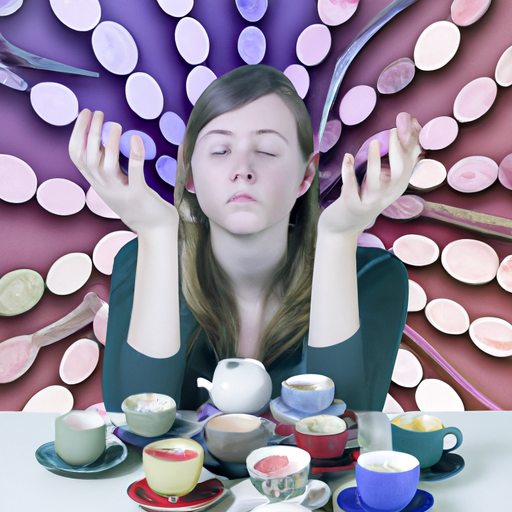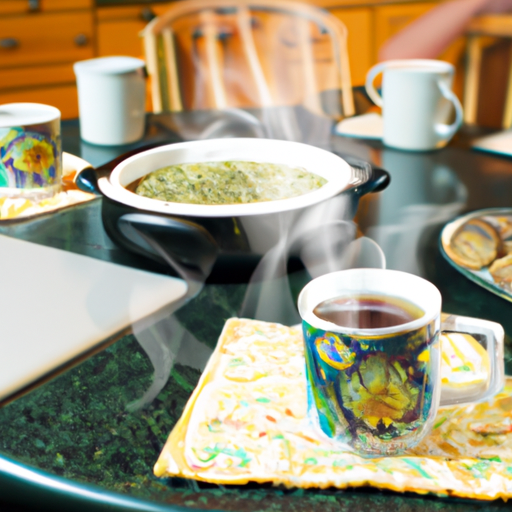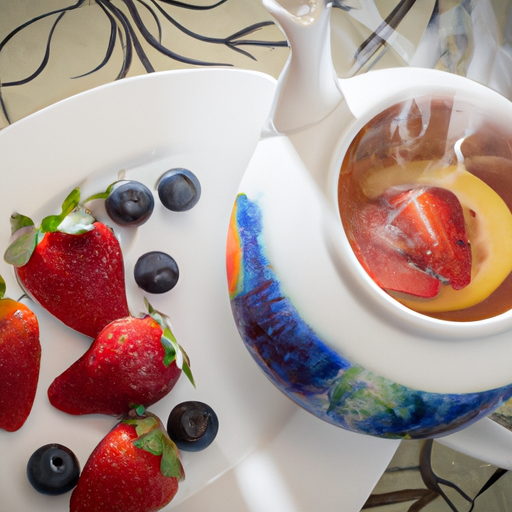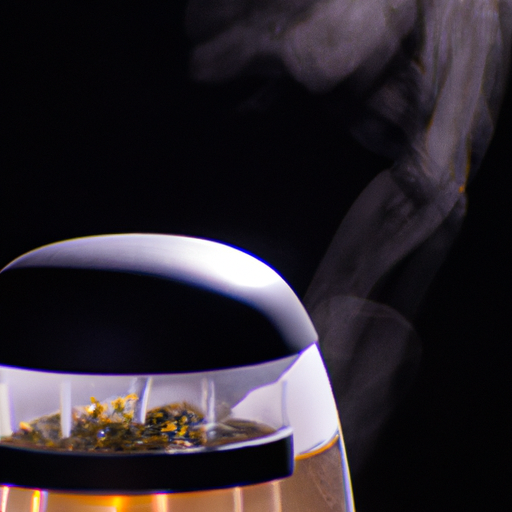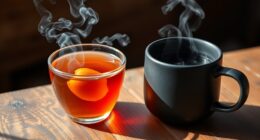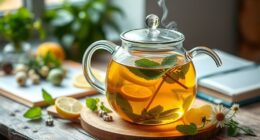Picture a serene garden, abundant with colorful flowers and captivating aromas.
At the core of this haven, sits a teapot brimming with a hot blend of herbs and spices.
As I pour myself a cup of this mystical potion, I am reminded of the ancient knowledge that has been passed down for generations – the medicinal properties of herbal tea.
Despite the peace and tranquility, a question emerges: where do we draw the line?
How can we find a balance between enjoying the numerous health benefits of herbal tea and steering clear of the potential hazards of excessive consumption?
In this article, we will examine the art of savoring herbal tea responsibly.
We will discuss the recommended daily intake, the risks of overindulging, and how to keep track of our herbal tea consumption.
So, grab your favorite mug and come along with me on this voyage of moderation and well-being.
Key Takeaways
- Herbal tea has potential health benefits, but it is important to consult with a healthcare professional before consuming large quantities or if you have any allergies or medications that may interact with the herbs.
- Daily intake of herbal tea should be limited and should not replace water intake for hydration.
- Excessive consumption of herbal tea can lead to dehydration, interfere with medications, increase caffeine intake, and pose risks during pregnancy.
- Monitoring and regulating herbal tea intake is important for maintaining good health, and moderation is key to avoid adverse effects.
The Health Benefits of Herbal Tea
Get ready to sip your way to better health with the incredible benefits of herbal tea! Herbal tea has been enjoyed for centuries due to its potential health benefits. Not only does it provide a soothing and comforting experience, but it can also aid in digestion.
Herbal teas, such as peppermint or ginger, have been known to help relieve bloating, indigestion, and stomach discomfort. They can also stimulate the production of digestive enzymes, which can improve overall digestion. However, it’s important to note that while herbal tea can be beneficial, it may also have potential side effects. Some herbs used in herbal teas can cause allergic reactions or interact with certain medications. Therefore, it’s always best to consult with a healthcare professional before consuming large quantities of herbal tea.
Now, let’s dive into the recommended daily intake of herbal tea.
Recommended Daily Intake of Herbal Tea
You should limit your daily intake of herbal tea to ensure a healthy balance in your routine. Herbal tea can be a great way to stay hydrated, but it’s important to remember that it shouldn’t replace your water intake completely. While herbal tea does contribute to your daily fluid intake, it’s still recommended to drink plain water throughout the day to stay properly hydrated.
Herbal tea can also play a role in weight loss as part of a healthy diet. Certain herbal teas, such as green tea and oolong tea, have been shown to boost metabolism and aid in fat burning. However, it’s important to note that herbal tea alone is not a magic solution for weight loss. It should be incorporated into a well-rounded diet and exercise routine for optimal results.
Transitioning into the next section about the potential risks of excessive herbal tea consumption, it’s important to understand the importance of moderation when it comes to herbal tea intake.
Potential Risks of Excessive Herbal Tea Consumption
Overindulging in excessive amounts of herbal tea can pose potential pitfalls for your health. It’s important to be aware of the potential side effects that can arise from consuming too much herbal tea.
Here are four things to keep in mind:
-
Dehydration: Herbal teas, especially those with diuretic properties, can increase urination and potentially lead to dehydration if consumed in excess.
-
Interference with medications: Some herbal teas can interact with certain medications, reducing their effectiveness or causing adverse reactions. It’s crucial to consult with your healthcare provider if you’re taking any medications.
-
Increased caffeine intake: While herbal teas are generally caffeine-free, certain varieties such as yerba mate or guayusa may contain caffeine. Excessive consumption of these teas can lead to caffeine-related side effects.
-
Pregnancy concerns: Certain herbal teas, like chamomile or peppermint, may be safe during pregnancy, while others, like sage or rosemary, should be avoided. It’s essential to consult with your healthcare provider before consuming herbal tea during pregnancy.
Understanding the potential risks associated with excessive herbal tea consumption is crucial for maintaining good health. Moving forward, let’s explore how to monitor and regulate your herbal tea intake.
Monitoring Your Herbal Tea Intake
Keeping track of how many cups of herbal tea you consume each day is a simple and effective way to ensure you maintain a healthy balance in your intake. Herbal tea can contribute to your hydration needs, as it is mostly water-based. However, it is important to remember that herbal tea should not replace plain water as your main source of hydration. Additionally, herbal tea has been known to promote digestive health, as certain herbs can have soothing properties on the stomach and aid in digestion. To help you monitor your herbal tea intake, I have created a table that shows recommended daily limits based on your age and health condition. This will help you make informed decisions and prevent excessive consumption. It’s crucial to find alternatives to herbal tea that can offer similar benefits, so let’s explore some options in the next section.
Alternatives to Herbal Tea
Looking for other options to enjoy? Let’s explore some alternatives to herbal tea in the next section.
If you’re looking to switch things up, there are plenty of herbal tea substitutes and alternatives available. One popular option is green tea, which offers similar health benefits and a mild, refreshing taste.
Another alternative is chamomile tea, known for its calming properties and floral flavor.
For those who enjoy fruity flavors, hibiscus tea is a great choice, with its vibrant color and tangy taste.
If you’re seeking a caffeine-free option, rooibos tea is a fantastic herbal tea alternative that has a naturally sweet and nutty flavor.
These herbal tea alternatives provide a variety of flavors and benefits to suit your preferences.
Now, let’s dive into the next section and explore how to enjoy herbal tea responsibly.
Enjoying Herbal Tea Responsibly
When it comes to enjoying herbal tea responsibly, it’s important to find balance in your tea routine. This means being mindful of how much herbal tea you’re consuming and how often.
It’s also crucial to be aware of the caffeine content in herbal teas, as some varieties can still contain small amounts of caffeine. By finding the right balance and being mindful of caffeine content, you can enjoy herbal tea in a way that suits your individual needs and preferences.
Finding Balance in Your Tea Routine
To strike the perfect balance in your tea routine, it’s essential to find just the right amount of herbal tea that satisfies your cravings without overdoing it. One way to achieve this is by finding variety and exploring different flavors.
Herbal teas come in a wide range of options, from soothing chamomile to invigorating peppermint. By trying out different blends, you can discover what works best for you and keep your tea routine interesting.
It’s important, however, to be mindful of the caffeine content in herbal teas, as some varieties may contain small amounts. In the next section, we will delve into the topic of being mindful of caffeine content and its impact on your tea routine.
Being Mindful of Caffeine Content
When it comes to finding balance in your tea routine, it’s important to be mindful of the caffeine content in herbal teas. While herbal teas are generally caffeine-free, some blends may contain small amounts of caffeine depending on the ingredients used. As someone who is sensitive to caffeine, I have learned to pay close attention to the potential effects it can have on my sleep. To help you navigate this, I have created a table below that outlines the caffeine content in common herbal teas. It’s important to note that individual caffeine sensitivity may vary, so it’s always a good idea to listen to your body and adjust your tea consumption accordingly. With this knowledge, we can now move on to the conclusion: moderation is key when it comes to enjoying herbal tea.
Conclusion: Moderation is Key
Ultimately, the key takeaway is that moderation is crucial when it comes to consuming herbal tea. Mindful drinking is essential to ensure we don’t exceed healthy limits. Here are some important points to consider:
-
Balance your intake: Herbal tea can provide various health benefits, but excessive consumption can lead to adverse effects. It’s important to strike a balance and not overdo it.
-
Know your limits: Each person’s tolerance for herbal tea varies. Pay attention to how your body reacts to different amounts and adjust accordingly.
-
Monitor caffeine intake: While herbal teas are generally caffeine-free, some blends may contain trace amounts. Be aware of this if you’re sensitive to caffeine or if you’re consuming herbal tea in the evening.
-
Consult a healthcare professional: If you have any specific health concerns or conditions, it’s always wise to consult with a healthcare professional who can provide personalized advice.
Being mindful of how much herbal tea we consume is essential to avoid any potential health implications. Moderation is key to enjoying the benefits without going overboard.
Frequently Asked Questions
Can herbal tea replace water in my daily fluid intake?
Herbal tea can be a beneficial addition to your daily fluid intake. While it can provide hydration, it is not a complete replacement for water. Regular tea contains caffeine, while herbal tea is caffeine-free, making it a healthier choice.
Can I drink herbal tea while pregnant or breastfeeding?
During pregnancy or breastfeeding, it’s important to be cautious about drinking herbal tea, especially if you’re on medication. However, there are certain benefits to herbal tea during pregnancy, such as relieving nausea and promoting relaxation.
Can herbal tea interact with any medications?
Herbal tea can interact with certain prescription drugs, potentially leading to adverse effects. It is important to check with a healthcare professional about possible interactions before consuming herbal tea, to ensure your safety and avoid any potential side effects.
Are there any specific herbal teas that should be avoided?
Specific herbal teas such as licorice root tea and chamomile tea should be avoided by individuals with certain health conditions. While these teas have potential benefits, they may also have side effects that could worsen existing conditions.
Can excessive herbal tea consumption lead to dehydration?
Excessive consumption of herbal tea can potentially lead to dehydration. This is because some herbal teas, such as diuretic ones, can increase urination and fluid loss. It is important to drink in moderation and stay hydrated.
Conclusion
In conclusion, after thoroughly investigating the truth of the theory surrounding herbal tea consumption, it’s evident that moderation is the key to enjoying this beverage responsibly.
While herbal tea offers numerous health benefits, exceeding the recommended daily intake can potentially lead to adverse effects. It’s important to monitor your herbal tea intake and be mindful of any potential risks associated with excessive consumption.
Remember, there are also alternative beverages available that can provide similar benefits. By enjoying herbal tea in moderation, you can continue to reap its health benefits without any negative consequences.

